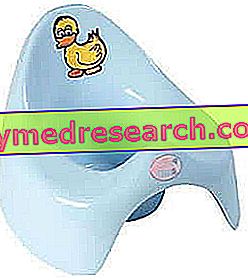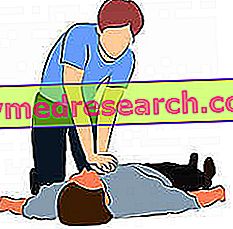What is Enuresis?
Enuresis consists of the involuntary emission of urine; this phenomenon becomes anomalous after the age in which bladder control is normally achieved.

Treatment options include behavioral and pharmacological measures.
Clinical definition
Enuresis is defined based on the following diagnostic criteria:
- The involuntary emptying of the bladder (in bed or clothes) occurs repeatedly;
- The behavior must be clinically significant:
- it must occur at least twice a week for at least 3 consecutive months
- or must determine psychological distress or compromise the social, educational or work area;
- The patient's biological age is at least 5 years;
- The condition is not exclusively caused by the direct physiological effects of a substance (such as a diuretic) or a general medical condition (anatomical abnormalities, endocrine disorders and urinary tract infections).
Premise: urination
Urination is the physiological process that determines the expulsion of urine. This, produced by the kidneys, is collected in the bladder, where it accumulates until it is eliminated through the urethra. The process of urination is regulated by the autonomic nervous system and coordinated by a reflex mechanism; it also implies the voluntary relaxation of the external urethral sphincter, an event that causes, with a mechanism mediated by the autonomic nervous system, the subsequent relaxation of the internal urethral sphincter. The urination stimulus is triggered by the stretching of the bladder walls.
Newborns do not have bladder control because the necessary cortico-spinal connections have not yet been established. There is a certain difference in the age at which children become physiologically aware of the need to urinate, so they are ready to reach a bath during the day or to wake up from sleep when the bladder is full. Parents should accustom the child, before the age of two, to anticipate the reflex with the voluntary contraction of the sphincter and thus exercise urination control.
Types of enuresis
- Nocturnal enuresis : the inability to control urination occurs during night rest (the so-called "bed pee");
- Diurnal enuresis : involuntary release of urine occurs during wakefulness;
- Mixed enuresis : it is the combination of nocturnal and diurnal enuresis.
Sometimes, enuresis is classified into two types, depending on when the problem develops.
- Primary enuresis : the child has never acquired control of urination;
- Secondary enuresis : represents a regression, that is, the child becomes enuretic after a long period (of months or years) of perfect control of the bladder function. Enuresis, in this case, is mainly nocturnal and often occurs in response to a stressful emotional situation.
Enuresis must be distinguished from:
- Incontinence : urine loss is continuous and uncontrollable. This condition may reflect damage to the central nervous system, spinal cord or nerves that innervate the bladder or external sphincter.
- Pollakiuria : urination is very frequent and can be induced by metabolic, renal, neuromuscular diseases or psychological disturbances.
Nocturnal enuresis
Nocturnal urine loss is more common than in daytime enuresis.
Most cases result from a combination of factors, including:
- Genetic factors and family history of enuresis: a genetic component is likely in many affected children; the incidence of the disorder is 40% if one of the parents was enuretic and 70% if they were both.
- Delay in physical development:
- Reduced bladder capacity;
- Underdevelopment of body alarms that indicate the need to urinate;
- Excessive urine production during the night: in most people, the secretion of vasopressin (or ADH) reduces the amount of urine produced during the night. Some children actually release less hormone and produce more urine than their peers. Because of this, they are more prone to wet the bed, especially when other factors are present.
- Difficulty in waking up during the night: often enuretic children have a deep sleep, in the sense that they cannot awaken easily during the night rest and are unable to recognize the bladder filling, when they need to urinate;
- Obstructive sleep apnea: interruption of breathing during sleep is associated with enuresis, as it decreases oxygen levels and can make the child less sensitive to the sensation of full bladder;
- Emotional problems, stressful events and anxiety: the child may be upset or worried due to conflicts in the parental couple, the birth of a baby brother or the beginning of school life;
- Chronic constipation: irregular bowel movements can irritate the bladder, as they limit its expansion. The problem can result in a decrease in bladder sensitivity and an increase in the frequency of urination.
Diurnal enuresis
Diurnal enuresis, not associated with urinary tract infection or anatomical abnormalities, is less common and tends to disappear earlier than nocturnal enuresis.
Possible causes of daytime incontinence include:
- Pathologies, such as overactive bladder;
- Wrong voiding habits (example: incomplete or infrequent bladder emptying).
Some factors that contribute to nocturnal enuresis can contribute to the onset of symptoms even during wakefulness. These include: poor bladder capacity, excessive urine production, constipation, stress and consumption of foods containing caffeine, chocolate or artificial colorings.
Polysymptomatic enuresis
When enuresis occurs in the absence of other symptoms attributable to the urogenital or gastrointestinal tract, one speaks of monosymptomatic (or simple) enuresis. Conversely, polysymptomatic enuresis is accompanied by other nocturnal and diurnal symptoms, such as:
- Frequent and urgent need to urinate;
- Painful urination;
- Blood in the urine;
- Chronic constipation;
- Encopresis (uncontrolled defecation in clothes);
- Unusual thirst;
- Fever (38 ° C or higher);
- Neurological symptoms: weakness, alterations in intestinal control or changes in gait.
Polysymptomatic enuresis can suggest the presence of a basic pathology and requires an uro-functional investigation.
When to consult a doctor
- Enuresis episodes are often traumatic for the child: apart from physical effects, such as skin irritation or the appearance of eruptions in the genital area, enuresis can have a negative impact on self-esteem. For this reason, the doctor should carefully evaluate the emotional and behavioral symptoms, in addition to the child's psychological or family condition, in which the origin and causes of enuresis are often hidden.
- If enuresis is polysymptomatic or if the disorder develops suddenly, an organic or malformative cause may be present, for example diabetes, urinary disorders (infections or anatomical and functional alterations of the urinary tract) and damage to the nerves that control the bladder (spine bifida or spinal cord injury). If the doctor suspects that an underlying condition is responsible for enuresis, he may recommend some investigations. For example, a chemical and bacteriological urine test can be used to rule out a urinary infection. The doctor can proceed by prescribing a specific therapeutic program.
Enuresis in adolescents and adults
Enuresis can continue into adulthood and only in some people it arises in old age, for a number of reasons.
If the subject has always suffered from enuresis, the following hypotheses can be advanced:
- Lack of necessary muscular and nervous control;
- Production of an excessive amount of urine.
If, on the other hand, the patient has recently lost control of urination, enuresis could be caused by:
- Urinary infection;
- Taking alcohol, coffee or diuretic drugs;
- sleeping pills;
- Diabetes;
- Emotional stress and anxiety;
- Other conditions, such as prostate gland hypertrophy, neurological problems and sleep apnea.
If enuresis persists or arises in adulthood, it is usually necessary to evaluate a specialist, such as a urologist.
Diagnosis
The assessment of enuresis may require medical history, complete physical examination and urine and blood tests. Depending on the circumstances, a laboratory evaluation allows you to check for signs of infection or diagnose diabetes.
The physical exam may include:
- Genital examination;
- Neurological examination;
- Abdominal examination;
- Inspection of the back and spine.
If your doctor suspects a structural urinary tract problem or other health problem, you can have the patient undergo an ultrasound of the kidneys and bladder or other imaging tests.
Treatment
Many children overcome enuresis naturally, without treatment. For this reason, in most cases, the first approach to the problem involves the implementation of some simple behavioral interventions. These measures include the control of fluid intake, timed emptying of the bladder, correction of constipation and, in some cases, rehabilitation of the pelvic floor. Avoiding drinks that contain caffeine (cola, tea, coffee or hot chocolate), and encouraging your child to go to the bathroom regularly during the day and before going to bed can help to overcome the problem.
Before starting behavioral therapy, it is necessary to make sure that the child is cooperative and that punishment and expressions of anger or frustration on the part of the parents must be absolutely discouraged. Enuresis takes time to resolve and periods of progress may occur, followed by relapses, so patience and understanding is essential.
Doorbell and cushion method : as soon as the enuretic begins to lose urine, the event is detected by a special sensor (inserted in the sheets or underwear) which triggers an audible warning. The alarm is intended to wake the subject who can then go to the bathroom to empty the bladder. A conditioning process leads the subject to learn how to stay dry. This is an effective system in about 80% of treated cases.
Read also: All Remedies for Night Enuresis
Pharmacological therapy
In cases where medical treatment is indicated, three types of drugs can be prescribed:
- Desmopressin . Some medical studies show that one of the causes of enuresis is a deficiency in the secretion of antidiuretic hormone during sleep (vasopressin or ADH causes the body to produce less urine). By prescription, the use of desmopressin, a synthetic version of the ADH hormone, is approved for the treatment of enuresis. The drug increases ADH levels and helps reduce the amount of urine produced by the kidneys. Desmopressin, formulated in tablets or nasal spray, must be taken by the child just before night rest. Except for occasional headaches or irritation of the nasal passages, patients do not seem to suffer from particular side effects.
- Imipramine. In special cases, under the control of a neurologist, the administration of imipramine can give good results. This drug is a tricyclic antidepressant that acts both on the brain and on the urinary bladder. Imipramine can relax the bladder muscles, increasing its capacity (if taken an hour before bedtime) and reduces the need to urinate. Side effects include nervousness, dizziness, dry mouth, headache, increased appetite, gastrointestinal disorders, fatigue and sensitivity to sunlight. It is important not to stop taking imipramine suddenly, as it can lead to withdrawal symptoms, such as malaise, anxiety and sleep disorders (insomnia). In addition, parents must be very careful to keep the drug out of reach of children, as it can be toxic if taken in high doses.
- Oxybutynin. If a young patient experiences diurnal enuresis due to an overactive bladder, the doctor may prescribe an anticholinergic drug. Oxybutynin helps to relax the bladder muscle, reducing the frequency of bladder contractions and delaying the need to urinate. Side effects may include nausea, drowsiness, dry mouth, constipation or diarrhea and headache.
The pharmacological treatment of enuresis is not curative and, after suspension, relapse is possible. However, this therapeutic option can be useful to limit the symptoms of the disorder during micturition rehabilitation.



